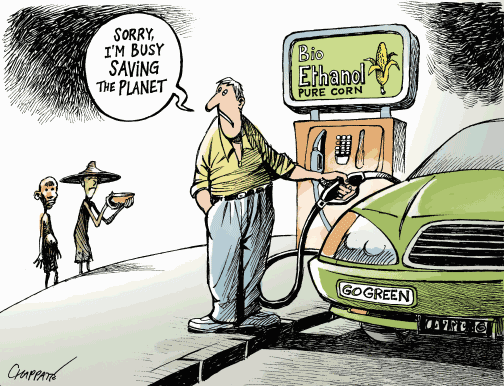 By JOHN M. CRISP Scripps Howard News Service April 15, 2008
In fact, in the 14th century, as the Black Death spread across China, India, and Europe and eventually killed about a third of the European population, some thought that all of civilization was coming to an end -- literally. And many American citizens of a certain age grew up with a deeply ingrained sense of potential destruction that had its roots in the long nuclear standoff between the United States and the U.S.S.R. The threat of thermonuclear disaster became a part of the landscape: we talked about it in school, we heard about it on TV and in the movies, and nearly all of us knew someone who had built a fallout shelter. In 1965 Barry McGuire's "Eve of Destruction" was at the top of the charts. But the apocalypse never happened, and even George Orwell's 1984 came and went, anticlimactically. The natural world appears to have plenty of endurance; it should keep chugging along for a long time, whether human beings are around to be a part of it, or not.  Artist Patrick Chappatte, The International Herald Tribune Distributed to subscribers for publication by Cagle Cartoons, Inc.
On the other hand, in a recent New York Times opinion column, Princeton economist Paul Krugman describes the current "world food crisis," and it's rather a dark picture. Even Americans are aware that food is costing more these days. Krugman says that part of the blame for the increase in food prices can be attributed to factors that aren't necessarily anyone's fault. But a great deal of the blame belongs to long-term trends and policies interwoven with the very fabric of our civilization, especially our extravagant appetite for energy. Food prices everywhere are being driven up by the burgeoning demand in China for meat, which is a relatively inefficient food; by the price of oil, an essential for industrial-scale agriculture; and by ill-advised efforts to substitute ethanol for our diminishing oil supply. All of these factors make a trip to the supermarket much more costly, even for Americans. But in the same edition of my local paper that carried the Krugman column, a report says that the Egyptian government is trying to mollify angry rioters with bonuses after two days of protests sparked by high food prices. Forty percent of Egyptians already live in poverty. An adjacent story reports that desperate Haitians stormed the presidential palace and had to be beaten back with rubber bullets and tear gas. Food prices in Haiti, already one of the world's poorest countries, have risen 40 percent during the last year, and Haitians aren't simply angry, they're hungry. Associated Press reporter Jonathan Katz says that some Haitians have resorted to "cookies" made of dirt, vegetable oil, and salt. Egypt and Haiti aren't exceptional. The U.N. warns that many poor nations -- and there are plenty of them -- are vulnerable to chronic malnutrition and the kind of unrest that only hunger can arouse. At present, we Americans are largely immune to this sort of disorder. I read Krugman's column in an IHOP, while enjoying the special: two eggs, two bacon, two sausages, two pancakes, and two French toast. But it's unrealistic to imagine that the consequences of this crisis won't affect us in ways more significant than somewhat higher prices in our lavish supermarkets. And the food crisis is closely connected with other foreboding predicaments like energy depletion, climate change, pollution, and rising tensions over diminishing resources of all types. Of course, the outlook for civilization has been grim before. Even the Black Death was overrated. In fact, nothing would please me more than to take my place in a long succession of discredited doomsayers. This time, however, looks and feels different. The roots and consequences of the current crises are truly global, and the disquieting part is that, even though disaster appears to be almost inevitable, very little is being done to prevent it.
E-mail him at jcrisp(at)delmar.edu Distributed to subscribers for publication by Scripps Howard News Service, http://www.scrippsnews.com
|
||